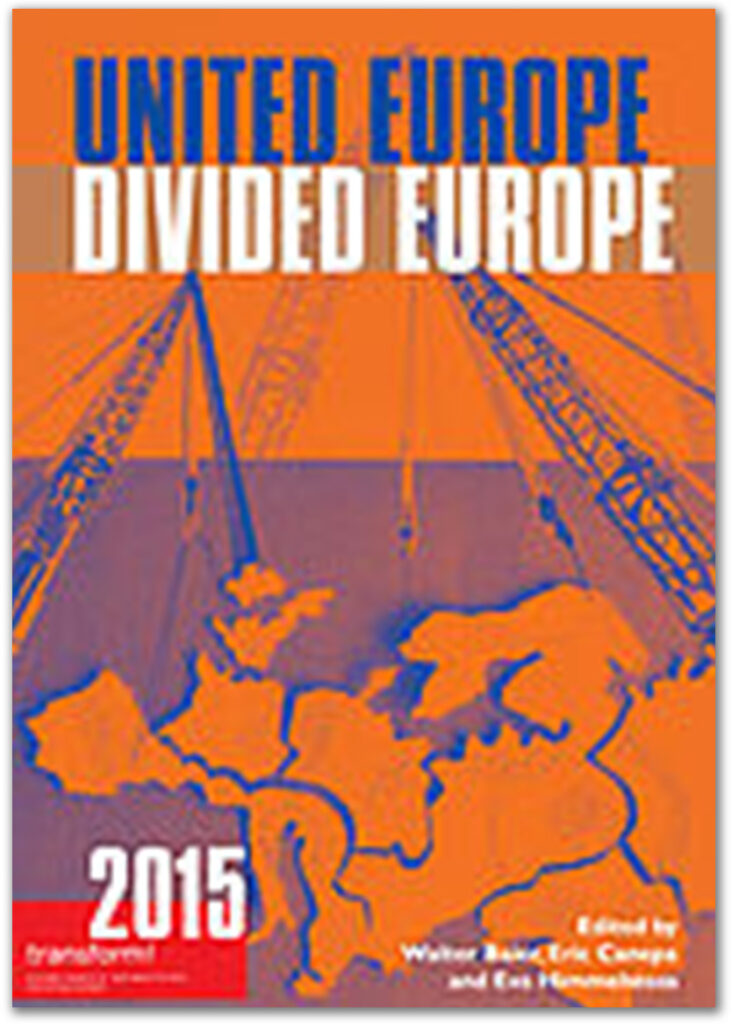Europe today is facing a multi-faceted crisis which has struck not only the continent’s economy, social systems, its politics, and democracy, but also the legitimacy of European integration and the values it stands for. The fact that a transnational entity such as the EU is pulled by the centripetal and centrifugal forces of its contradictions is nothing new, and it is not particularly alarming in itself. However, the European crisis, which broke out in 2008, and neoliberal austerity policies have exacerbated contradictions within and between the European states in a way that has caused ruptures of historic proportions.
In this volume we try to examine these ruptures from various perspectives. In the first part, essays by Étienne Balibar, Walter Baier, and a collaborative article by Elisabeth Gauthier, Joachim Bischoff, and Bernhard Müller attempt to draw the connections between newly arising national conflicts, the visible crises in social relations and democracy, and the diminishing appeal of European integration. This set of alarming developments also constitutes the background for growing right-wing populism on an EU scale which – despite some borrowings – greatly differs from traditional fascist movements. The first part of this book will conclude with Frank Deppe’s essay ‘What Does History Tells Us?’, which traces the deep historical roots of the European crisis.
This volume begins, however, with an extensive interview with Alexis Tsipras whose party Syriza (which was founded in 2012) not only represents a realistic alternative to the governing parties in Greece but, in light of its possible accession to power, could set a European precedent and may yet profoundly change Europe’s political landscape.
In the second volume of the book Steffen Lehndorff, Patrice Cohen-Séat, Gabriel Colletis, Marc Delepouve, Lutz Brangsch, and Anej Korsika examine individual fault lines in the European construct, austerity policies, the EU’s unchanged undemocratic structure, potential European industrial and research policies and, finally, the European Union’s relationships with its neighbours, which is becoming increasingly strained.
In the third section we return to the European elections, which were held in the middle of last year. Cornelia Hildebrandt, Fabien Escalona, Mathieu Vieira, and Thilo Janssen attempt a global picture pieced together from the outcomes in all 28 member states. What emerges is a significant increase in the votes of the radical left in Europe but also substantial growth within the radical and populist right, its nationalism infecting the whole right-wing spectrum, as we can see in the European Parliament.
Inger Johansen (Denmark), Luís Ramiro and Jaime Aja (Spain), Alfonso Gianni (Italy), Jiří Málek (Czech Republic), and Holger Politt and Krysztof Pilawski (Estonia, Latvia, Lithuania, and Poland) present some of the most interesting election results.
The volume closes with Maxime Benatouil’s report on the activities of the transform! europe network in 2014.
The transform! europe network was established in 2001 during the World Social Forum in Porto Alegre by a small group of intellectuals from six different European countries, representing left research institutions or journals, who wanted to coordinate their research and educational work. Today transform! consists of 27 member organisations and observers from 19 countries.
The network is coordinated by a board of eight members, and its office is located in Vienna. transform! maintains a multilingual website and publishes a continuously growing number of reports, analyses, and discussion papers on issues related to the process of European integration.
In publishing this yearbook, we would like to further expand our contribution to the sociological and political science debates. Just like the biannual journal which transform! published from 2007 to 2013, the yearbook will be simultaneously published in several languages; it now appears in English, French, German, Greek, and Italian. Expanding our audience and broadening the horizon of the experiences reflected in transform! are not the only reasons why we publish our journal in several languages. We do not see translation as a mere linguistic challenge but consider it a way to bridge political cultures that find their expression in different languages and in the varied use of seemingly identical political concepts. This kind of political translation is of particular importance when set against the current historical backdrop of the left in Europe, and it focuses on finding unity in diversity by combining different experiences, traditions, and cultures. It is at the heart of transform! europe’s work.
We would like to thank all those who have embarked on this adventure with us: our authors, our coordinators for the various language editions, and finally our publishers, especially Merlin Press.
Walter Baier, Eric Canepa, and Eva Himmelstoss
